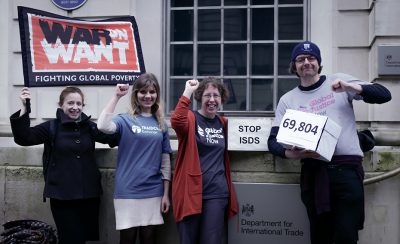70,000 Demand ‘Corporate Courts’ Kept Out of Post-Brexit Trade Deals

As the UK trade minister Greg Hands visits the United States for trade talks (1), an alliance of civil society groups this morning delivered nearly 70,000 signatures to the Department for International Trade calling on the UK government to commit to keeping controversial ‘corporate courts’ out of post-Brexit trade deals.
The petition, collected by the Stop ISDS campaign which is backed by more than 40 civil society organisations and trade unions in the UK (2), calls for the UK government to commit to excluding investor-state dispute settlement, or ISDS, from future trade and investment deals with countries including the United States.
ISDS is a secretive shadow legal system written into thousands of trade and investment deals around the world. These ‘corporate courts’ give foreign companies the power to sue for millions over laws that harm their profits. They have been used by corporations to challenge laws including health warnings on cigarette packets, raising the minimum wage and protecting the environment from mining.
Leaked papers from preliminary US-UK trade talks last year indicated that the US government has proposed including ISDS in a US-UK trade deal (3). The UK government today announced that US-UK negotiations will begin later this month (1).
Leah Sullivan, senior trade campaigner at War on Want said:
“This is a clear call to the Government to reject ISDS in its entirety; it’s anti-democratic and hands power to corporations to undermine our basic human rights. UN independent experts have already said ISDS ‘should be abolished’ – now we need a commitment that it will not be part of the UK’s trade and investment policy.”
Mary Milne, head of campaigns & communications at Traidcraft Exchange said:
“This petition shows that the UK public believes ISDS has no place in trade deals. It’s a deeply unfair system sold to poorer countries under the premise of attracting foreign investment. Instead, it gives multinational companies a powerful tool to challenge government policies aimed at protecting human rights, public health and the environment. This completely contradicts the UK’s commitments to the Sustainable Development Goals and the Paris Climate Agreement.”
Jean Blaylock, trade campaign and policy manager at Global Justice Now said:
“Big business has used corporate courts to sue governments outside of the national legal system on everything from fossil fuels to water prices to anti-smoking policies. Corporate courts were thoroughly rejected when TTIP, the EU-US trade deal, was killed off four years ago. But now the threat has been resurrected in the wake of Brexit, starting with a trade deal with Trump.”
*
Note to readers: please click the share buttons above or below. Forward this article to your email lists. Crosspost on your blog site, internet forums. etc.
Notes
2. The Stop ISDS campaign is supported by more than 40 civil society groups and trade unions in the UK. See https://stopisds.org.uk/. The UK campaign is allied with European Stop ISDS campaign, which has collected a further 850,000 signatures calling on the EU to remove ISDS from trade and investment deals. See https://stopisds.org/

